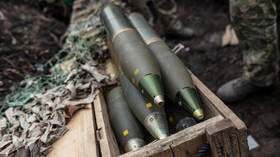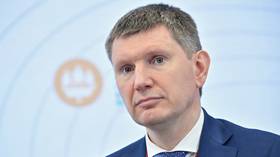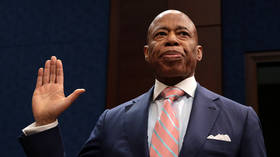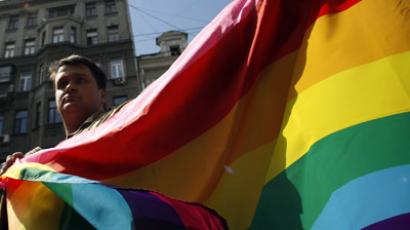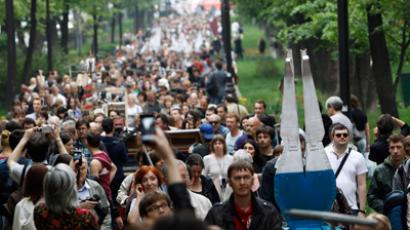Tens of thousands in 'March of millions' Moscow protest (VIDEO)
The Russian opposition has held a mass anti-government rally in the country's capital. It was the first so-called “March of Millions” demonstration since mass protests on May 6 were marred by violence and hundreds of arrests.
Organizers say that around 100,000 people gathered for the mass demonstration. Moscow police have confirmed up to 22,000 people were participating in the rally, which wrapped up at 4pm (12:00 GMT) with no arrests made. Protesters began the rally on Strastnoy Boulevard at 12pm (08:00 GMT) and marched across the center of Moscow to finish on Sakharova Avenue with a meeting and music concert. The demonstration concluded two hours earlier than planned as heavy rain drenched the activists.At Sakharova, opposition leaders addressed the tens of thousands of protesters who had gathered. The rally’s manifesto was announced. It demanded President Vladimir Putin resign and a new election law be drawn up. “Snap elections should be held according to the new law. The Parliament should also call a referendum to reshape the Constitution. The revamped Constitution should limit the president’s authority and his term of office,” said Evgenia Chirikova, leader of the Movement to Defend the Khimki Forest.
The rally attracted various groups, including independent opposition activists and members of opposition parties Fair Russia and Yabloko, the Communists and the democratic coalition Solidarnost (Solidarity), as well as nationalists, LGBT movement members and many others.As the demonstration got into full swing, key opposition figures Sergey Udalstov and Boris Nemtsov were called for questioning by the Russian Investigative Committee as part of a probe into the violence at the anti-government rally on May 6.Moscow authorities stepped up security in the city in preparation for the demonstrations, with over 12,000 police deployed. Many praised the police's totally "non-aggressive and attentive" stance. Following unrest during May’s protests, the Russian government has introduced harsher punishments for those who violate rally rules. The violence during the last March of Millions demonstration has been largely attributed to the involvement of more radical opposition groups.The new legislation places significant fines of up to $9,000 on those who attend unsanctioned rallies or cover their faces during protests. The government has said the measures have been put in place to maintain public order, but opposition members have branded the bill as a financial curfew.
Opposition leaders’ homes searched
The homes of key members of the opposition were searched by police on Moscow as part of an ongoing probe into the violence that marred the May 6 protests.Aleksey Navalny, Ilya Yashin and TV personality Ksenia Sobchak were among those who had their properties searched, according to officials from the Russian Investigative Committee.A spokesman for the committee, Vladimir Markin, said the police found more than €1 million (US$1.25 million) and US$480,000 in cash during the Monday raid on Sobchak’s apartment. He said they would try to determine if the Russian TV host and daughter of St. Petersburg’s late mayor has paid taxes on the money that she kept in more than 100 envelopes. Investigators also intend to find out what Ksenia Sobchak planned to do with all this cash.All those who had their apartments searched will be required to appear for questioning on Tuesday.The investigation seeks to discern if any of the opposition figures are guilty of organizing mass unrest. If charged, they could face a potential jail sentence of 10 years.Authorities reportedly seized documents, political banners, computers and up to 1.5 million euro from the targeted apartments.



